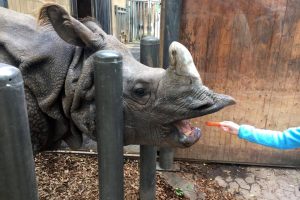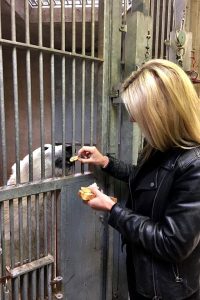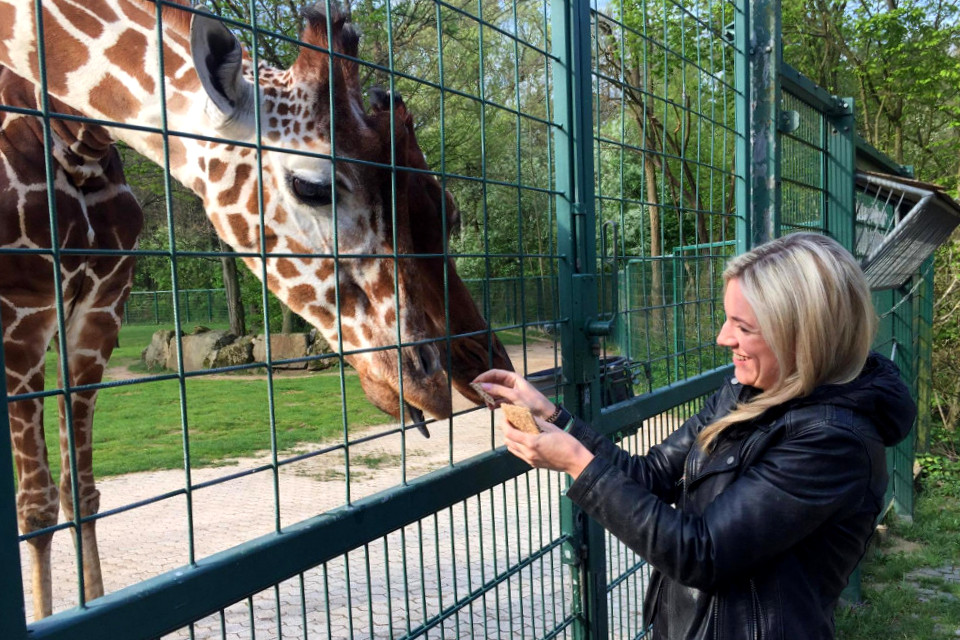Exclusive for zoos.media – 20.07.2017. Author: Philipp J. Kroiß
Zoo education is writ large in Nuremberg Zoo: with a great offering, which aims to combine human and animal in different ways.
Zoo education in Nuremberg Zoo: very close to the animals
Zoo education programs are the opposite of boring when they are close to the animals – both in terms of content and also physically. Nuremberg Zoo offers its visitors a varied and exciting programme. Nicola Ohnemus gave zoos.media an insight into these interesting, but also important programmes and generously provided information and image material.
Tours are just the start

General guided tours are usually the starting point for zoos. If you want to develop further, they usually also offer special tours for specific target groups or on specific topics. By far the most popular are programmes that take the visitors “behind the scenes”. Here visitors can find out what the normal visitor does not get to see.
In Nuremberg Zoo, for example, you can book a “visit to your favourite animal”. Interested visitors can feed and caress rhinoceroses, which the animals visibly enjoy. The same is possible with tapirs and camels. Or who has ever been in the middle of a harmonious group of dead-headed monkeys? This is possible within the zoological programme of Nuremberg Zoo. Standing in front of a giraffe is very impressive and how wonderful it would be if you can actually feed them.
If you want to experience some animal training, watch the training of the sea lions and you can also feed and/the agile mammals. In Makis you can even do some work yourself and feed the animals as well. Even the curious Sakis can be fed up close. You can also get near to the powerful gorillas – or even feed polar bears out of your own hands. If you want something a bit smaller, penguins can be a delight.
Unforgettable time with the animals

No matter which animal you choose, you get about an hour of varied, instructive and exciting programme. You are with the animals for between 10 minutes and half an art – depending on the species. The well-being of the animals is the top priority and you will find out how they are kept and learn a lot about your favourite animal, as well as about the species and the habitat whose ambassador is the beast.
So you get very close to the animals – once through everything you learn during the programme and once through the physical proximity to the animal. Thus, as a zoo, they can create experiences that inspire people to an extraordinary urge for the protection of the animals.
Also popular are the “Encounters with Dolphins”, “Visit to the Monkey House” and “Encounters on the Amazon”. They are about certain enclosures and the animals in them. There is also a workshop on the activities of the zoo animals. In four hours you first apply enrichment and after half that time you bring it to the appropriate animals from four to six different species.
The zoo, like all other programmes, particularly pays tribute to knowledge and answers numerous questions. How do you ensure that the dolphins are okay? How do you deal with monkeys? How is it possible to build the Amazon so authentically and naturally? Visitors can find all this out.
Zoo education brings humans closer to animals – on the levels of knowledge and experience. The programmes of Nuremberg Zoo are a perfect example of how wonderfully well this works.
Zoo education plays an important role

Ultimately, we only protect what we love,
We only love what we know
And we only know what has been brought to us.
Baba Dioum
In a time when more and more people live in cities, zoos are windows on the wilderness, which bring humans closer to nature in the truest sense of the word. The modern zoo educational offering intensifies this still more and thus multiplies its effect.
You can read a lot about the threat to rhinos, and sometimes even watch moving pictures of them, but a direct encounter is something completely different and connects people much more with the animals than the media can ever communicate. If you actually have the chance to feed a rhinoceros and to learn more about it in a separate guide, then what Baba Dioum means comes true: an access to the animal, which makes its survival and protection an emotional need.
In a society that seems to be increasingly alienated from nature, zoo education is in a key position: although some people are moving away from nature, they can get quite close here to what they should protect on many levels
